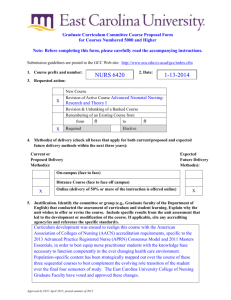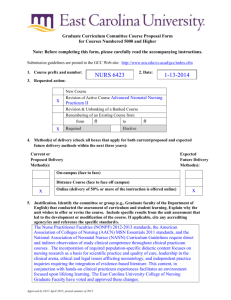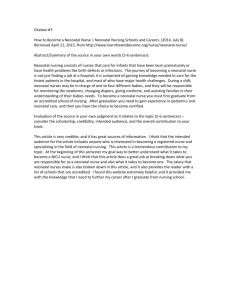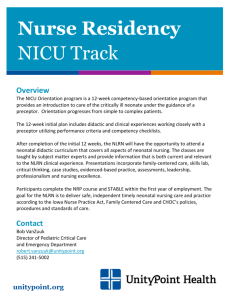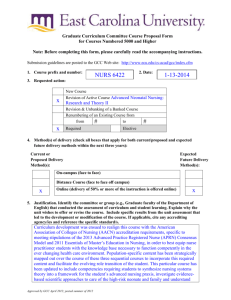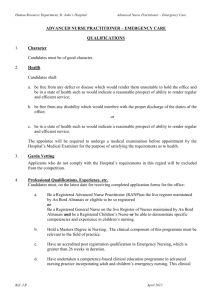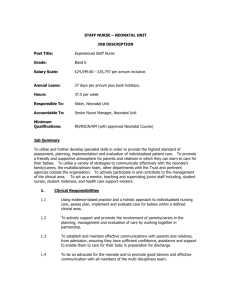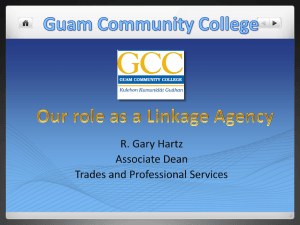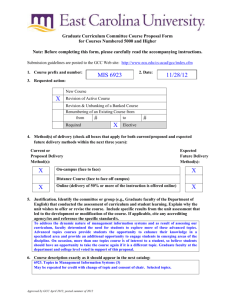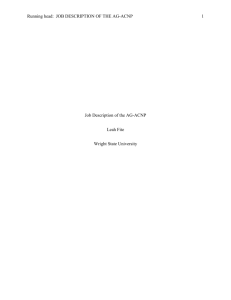NURS 6424 - East Carolina University
advertisement
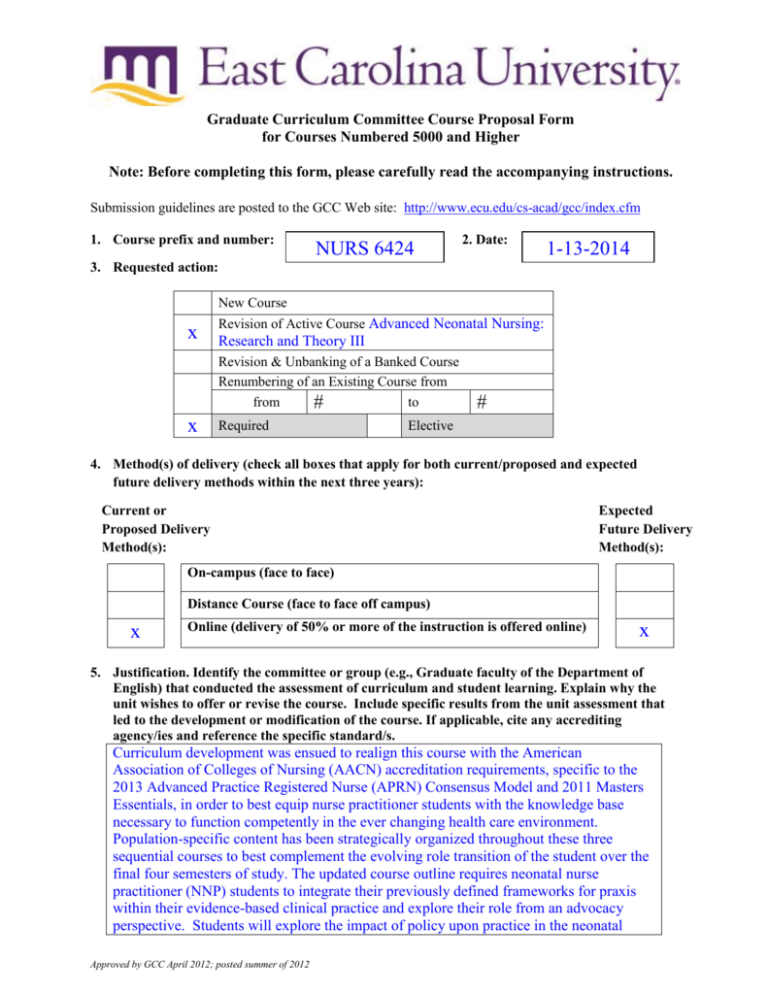
Graduate Curriculum Committee Course Proposal Form for Courses Numbered 5000 and Higher Note: Before completing this form, please carefully read the accompanying instructions. Submission guidelines are posted to the GCC Web site: http://www.ecu.edu/cs-acad/gcc/index.cfm 1. Course prefix and number: NURS 6424 2. Date: 1-13-2014 3. Requested action: New Course x Revision of Active Course Advanced Neonatal Nursing: Research and Theory III Revision & Unbanking of a Banked Course Renumbering of an Existing Course from from to # x Required # Elective 4. Method(s) of delivery (check all boxes that apply for both current/proposed and expected future delivery methods within the next three years): Current or Proposed Delivery Method(s): Expected Future Delivery Method(s): On-campus (face to face) Distance Course (face to face off campus) x Online (delivery of 50% or more of the instruction is offered online) x 5. Justification. Identify the committee or group (e.g., Graduate faculty of the Department of English) that conducted the assessment of curriculum and student learning. Explain why the unit wishes to offer or revise the course. Include specific results from the unit assessment that led to the development or modification of the course. If applicable, cite any accrediting agency/ies and reference the specific standard/s. Curriculum development was ensued to realign this course with the American Association of Colleges of Nursing (AACN) accreditation requirements, specific to the 2013 Advanced Practice Registered Nurse (APRN) Consensus Model and 2011 Masters Essentials, in order to best equip nurse practitioner students with the knowledge base necessary to function competently in the ever changing health care environment. Population-specific content has been strategically organized throughout these three sequential courses to best complement the evolving role transition of the student over the final four semesters of study. The updated course outline requires neonatal nurse practitioner (NNP) students to integrate their previously defined frameworks for praxis within their evidence-based clinical practice and explore their role from an advocacy perspective. Students will explore the impact of policy upon practice in the neonatal Approved by GCC April 2012; posted summer of 2012 intensive care environment and develop strategies to proactively appraise, advocate, and promote health on an individual and systems level. Students will be challenged to analyze the health trajectory of care of the neonate, as opposed to the individual clinical visit, and select evidence-based strategies to coordinate long-term attainment of optimal health for the neonate and family. An investigation into communication theory, multidisciplinary collaboration, and individual leadership and professionalism provide students with the tools necessary to enact change and facilitate high-quality care. This course serves to prepare the student for their final semester of study, which culminates with the completion of the role transition to the novice NNP. The East Carolina University College of Nursing Graduate Faculty have voted and approved these changes. 6. Course description exactly as it should appear in the next catalog: NURS 6424 – Advanced Neonatal Nursing: Research and Theory III 3 May be repeated upon readmission to the concentration. P: NURS 6422. Focuses on the collaborative integration of advanced knowledge to care for the infant and the family with complex needs. 7. If this is a course revision, briefly describe the requested change: Revisions to course description, topical outline and required textbooks. 8. Course credit: Lecture Hours 3 3 Weekly OR Per Term Credit Hours Lab Weekly OR Per Term Credit Hours s.h. Studio Weekly OR Per Term Credit Hours s.h. Practicum Weekly OR Per Term Credit Hours s.h. Internship Weekly OR Per Term Credit Hours s.h. Other (e.g., independent study) Please explain. 9. Anticipated annual student enrollment: 10. Changes in degree hours of your programs: Degree(s)/Program(s) Changes in Degree Hours MSN Neonatal Nurse Practitioner none 11. Affected degrees or academic programs, other than your programs: Degree(s)/Program(s) Changes in Degree Hours n/a n/a 12. Overlapping or duplication with affected units or programs: x Not applicable Approved by GCC April 2012; posted summer of 2012 s.h. 3 Total Credit Hours s.h. 12-18 s.h. Documentation of notification to the affected academic degree programs is attached. 13. Council for Teacher Education (CTE) approval (for courses affecting teacher education): x Not applicable Applicable and CTE has given their approval. 14. University Service-Learning Committee (USLC) approval: x Not applicable Applicable and USLC has given their approval. 15. Statements of support: a. Staff x Current staff is adequate Additional staff is needed (describe needs in the box below): b. Facilities x Current facilities are adequate Additional facilities are needed (describe needs in the box below): c. Library x Initial library resources are adequate Initial resources are needed (in the box below, give a brief explanation and an estimate for the cost of acquisition of required initial resources): d. Unit computer resources x Unit computer resources are adequate Additional unit computer resources are needed (in the box below, give a brief explanation and an estimate for the cost of acquisition): e. ITCS resources x ITCS resources are not needed The following ITCS resources are needed (put a check beside each need): Mainframe computer system Statistical services Network connections Computer lab for students Software Approval from the Director of ITCS attached 16. Course information (see: Graduate Curriculum and Program Development Manual for instructions): Approved by GCC April 2012; posted summer of 2012 a. Textbook(s) and/or readings: author(s), name, publication date, publisher, and city/state/country. Include ISBN (when applicable). Required Text Books American Psychological Society. (2009). Publication manual of the American Psychological Society (6th ed.). Washington, DC: Author. ISBN# 9781433805615 Fanaroff, A. & Martin, R. (2011). Neonatal-perinatal medicine: Diseases of the fetus and infant. (9th Ed.). St. Louis, MO: Mosby. ISBN# 9780323065450 Joel, L. (2013). Advanced practice nursing: Essentials for role development (3rd ed.). Philadelphia, PA: F.A. Davis. ISBN# 978-0803627857 b. Course objectives for the course (student – centered, behavioral focus) If this is a 5000-level course that is populated by undergraduate and graduate students, there must be differentiation in the learning objectives expected. Upon completion of this course, students will be able to: 1. Develop strategies to act as a change agent within the healthcare system. 2. Advocate the advanced practice nursing role to multiple stakeholders (e.g. parents, community, integrated healthcare teams, and policy makers). 3. Demonstrate an understanding of the interrelationship between financial reimbursement, meaningful use, and continuous quality improvement initiatives as it pertains to the role of the advanced practice nurse. 4. Integrate models of health promotion, disease prevention and wellness in coordinating meaningful and developmentally appropriate continuing care of the high-risk neonate and family. 5. Synthesize the impact of continuing education, professional accountability, lifelong learning and mentoring on the role of the advanced practice nurse. c. Course topic outline The list of topics should reflect the stated objectives. 1. Scientific Foundations for Care (Obj. 4) a. Neurodevelopmental milestones including long-term outcomes b. Follow-up and continuing care for the technology dependent neonate 2. Quality, Policy, and Practice within the Health Delivery System (Obj. 1, 2, 3, 4, 5) a. Healthcare policy, economics, and advocacy: neonatal nurse practitioners as change agents in a dynamic healthcare system b. Third-party reimbursements c. Medical coding and reimbursement d. Continuous quality improvement 3. Information Literacy (Obj. 1, 2, 3, 4, 5) a. Communication theories and strategies for the neonatal nurse practitioner b. The collateral role of teaching, research and education for the neonatal nurse practitioner c. Sudden infant death syndrome: theory-based family education programs 4. Leadership and Independent Advanced Nursing Practice (Obj. 5) a. The adult learning theory and accountability in professional practice b. Performance reviews and credentialing Approved by GCC April 2012; posted summer of 2012 d. List of course assignments, weighting of each assignment, and grading/evaluation system for determining a grade Manuscript Submission……...…………………...………….…………….20% Threaded Discussion Board Posts….……….…………………………......20% MSN Essentials Reflective Essay….……….……………………………...20% Midterm Exam……….…………..………………………………………...20% Final Exam…...…………………..………………………………………...20% TOTAL: 100% Grading: A course grade of B or above is required to progress in the NNP concentration 100-90%....................A 89.9-80%...................B 79.9-70%...................C 69.9-0%.....................F Approved by GCC April 2012; posted summer of 2012
